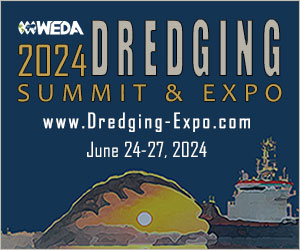IRPT Forms Dredge Focus Group
The Inland River Ports & Terminals (IRPT) association held its second Dredge Focus Group meeting on May 29 at the Rosedale Bolivar County Port in Mississippi. The group first met on March 19 and formed for ports to discuss the important issues regarding dredging.
Aimee Andres said the meeting covered a variety of topics including the Maritime Administration the State Department of Transportation the U.S. Army Corps of Engineers ports and dredging contractors.
The meeting began with a discussion of the Harbor Maintenance Trust Fund (HMTF) and its language in the Water Resources Reform and Redevelopment Act (WRRDA). A flow chart from American Association of Port Authorities (AAPA) facilitated the discussion about funds allocation which is set to increase each year. Funding allocation would no longer be placed solely on cargo numbers and include national and regional significance national security and military readiness. Ports and harbors were also categorized as high use (10M tons per year) moderate use (1 to 10M tons per year) and emerging harbors (less than 1M tons per year). Funds would be distributed to high and moderate use projects at 90 percent and 10 percent would go to emerging harbors.
For ports along the river those who use it more are prioritized in the dredging budget; however small ports and harbors categorized as underserved would receive 12.5M in funding and as the group discussion noted competition for those funds would be quite steep.
IRPT stressed the importance of ports reflecting accurate tonnage. Also it would like to quell the myth that reporting higher tonnage numbers would give port authorities more incentive to raise lease rates. In reality the tonnage numbers relate only to funding. The discussion noted also some of the concerns ports had regarding confidentiality.
“IRPT believes that in educating the port terminal and shipping professionals on the impact of reporting it will help create a more productive relationship. It will be imperative that the Army Corps is involved in this as well. Confidentiality concerns do exist when turning over that kind of information and shippers want to be assured by the Corps that the numbers they are reporting are NOT being used for taxing purposes” Andres said.
The Corps is proposing public hearings in each of the 26 watershed basins but Andres said the meetings have been stalled by funding issues. IRPT is urging its members to urge the Corps to move forward with these meetings.
“It is not up to one port one region or one organization to educate and knock on doors. It will take an industry as a whole. We must vocalize the need and we can join together in this process. There are many associations there are many ports regions etc. but we must work together because we have mutual interest” Andres said. The discussion at the second dredge focus group also looked at how the Corps procurement process for contracting dredging projects is wasting money and there is no standard from district to district. This is causing higher overheads costs and overall dredging costs could be reduced by streamlining the process. Andre said this will be a topic of discussion at the next Dredge Focus Group. The focus group is also looking to draft a letter to Corps headquarters encouraging it to move forward with the public hearings for port tonnage reporting and HMTF funding.
Other topics of discussion at the second meeting included how the State Department of Transportation’s budget for highways could be used for marine highways and more about tonnage reporting.



